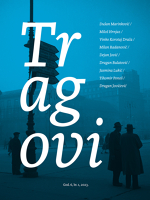Nalaženja Stanka Koraća – Jedna paradigmatična priča ili otpor institucionalnoj asimilaciji
Self-searching of Stanko Korać – A Paradigmatic Story or a Resistance to Institutional Assimilation
Author(s): Dušan MarinkovićSubject(s): Cultural history, Post-War period (1950 - 1989), Identity of Collectives
Published by: Srpsko narodno vijeće, Arhiv Srba u Hrvatskoj
Keywords: Biography; Stanko Korać; Serb Cultural Society Prosvjeta; Serbs in Croatia; History of Literature; Culture; Multiculturalism;
Summary/Abstract: In this article, the author presents a biography of Dr Stanko Korać – from his early days to his employment in Serb Cultural Society “Prosvjeta” in Zagreb in 1969. Before arriving to the Society, Korać achieved a respectable reputation as literary historian and theoretician, professor and director of the Education Sciences Academy in Karlovac, as well as author of articles published by several academic and professional institutions in Croatia and Serbia. In “Prosvjeta” he will become an editor of its Publishing House, as well as of magazine “Prosvjeta”. He published edited volumes as well as Prosvjeta's Yearbook (Ljetopis), publications whose focus was on research and public presentation of literature and culture of Serbs in Croatia. Subsequently, he gradually reduced his interest in other Croatian literature and focused almost entirely on literary works written by Serbs in Croatia. He takes as his main objective to publish his research results in academic and professional publications. In turbulent times of “Maspok”, he was a staunch defender of SCS “Prosvjeta”, as the only existent cultural institution of Serbs in Croatia. When he started warning that institutions of the Republic neglected the need for Serbs in Croatia to develop its own institutions in order to develop modern cultural consciousness, he was met with resistance to this idea. Korać was born in 1929 in Čemernica near Vrginmost in Banija, Croatia. He was orphaned in 1943, during the war. He graduated Yugoslav languages and literature as well as Russian language and literature at the Faculty of Humanities and Social Sciences in Zagreb, where he also obtained his PhD on Croatian Novels in Modernism. He authored ten books, of which the most significant is A Review of Literary Works by Serbs in Croatia. Being Secretary to the newly re-established Prosvjeta in 1991, he left Zagreb during the conflict and died in Belgrade in 1994.
Journal: Tragovi: časopis za srpske i hrvatske teme
- Issue Year: 6/2023
- Issue No: 1
- Page Range: 7-44
- Page Count: 38
- Language: Croatian

